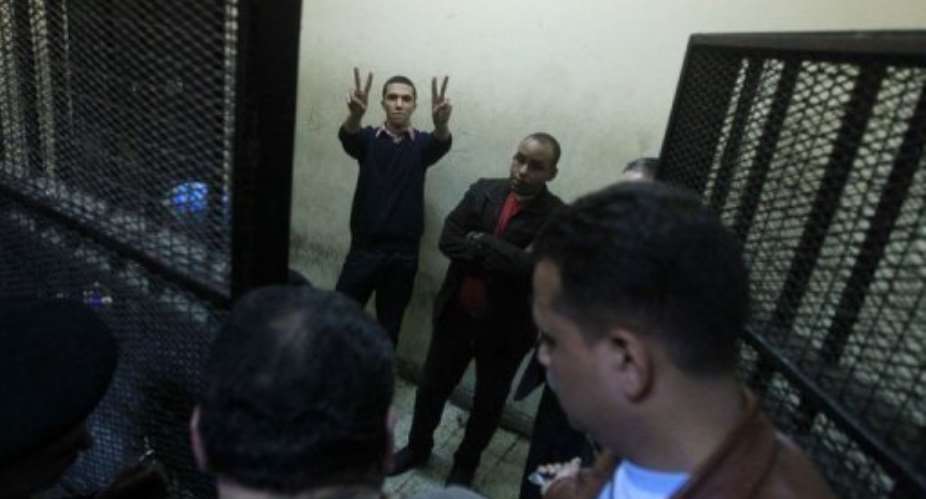CAIRO (AFP) - American and other foreign democracy activists on trial in Egypt flew out of Cairo airport on Thursday, airport officials said, a day after the judiciary lifted a travel ban on them.
Their departure is expected to ease tensions with Washington, which had urged Egypt's military rulers to resolve the case which American officials had suggested could imperil US aid to its key Middle Eastern ally.
Airport officials said 17 foreigners including nine Americans who had been on the no-fly list left aboard a private aircraft which had flown in from Cyprus. Its onward destination was not clear.
The official MENA news agency reported that the Americans arrived at the airport in five vans, accompanied by a US embassy official.
Along with the Americans, the foreign defendants on trial on charges of receiving illicit foreign funds are Norwegian, Serbian, German, Palestinian and Jordanian.
The only defendants who appeared at the trial's opening session on Sunday, days before the judges recused themselves without providing an explanation, were all Egyptians.
Earlier on Thursday, the head of the Cairo appeals court, Abdel Moez Ibrahim, confirmed that the travel ban had been removed and that each defendant had paid two million pounds (roughly $330,000/247,000 euros) in bail.
The Americans include Sam LaHood, the son of US transportation secretary Ray LaHood and head of the International Republican Institute (IRI) in Egypt. He and several other US citizens had taken refuge inside their Cairo embassy.
The other foreign groups involved in the trial are the National Democratic Institute, Freedom House, the International Centre for Journalists -- all American -- and the German Konrad Adenauer Foundation.
The trial, which came after raids on the groups' offices in December, led to a crisis in relations between Egypt and Washington, a close ally of the strategic nation.
Egypt's military, in power since an uprising ousted president Hosni Mubarak a year ago, appeared to have underestimated the fallout from the crackdown on the civil society groups.
The raids came amid growing unrest against the generals, as the authorities suggested that the regime's opponents were being directed by foreigners, playing on abundant suspicion in the country of foreign plots, particularly US and Israeli.
Fayza Abul Naga, the international cooperation minister believed to have sparked the probe into the groups, told investigating judges that the NGOs were part of an American conspiracy to spread chaos in Egypt.
On Thursday, she insisted that the trial would go on once a new judicial panel has been appointed.





 Saglemi Housing Project will not be left to rot – Kojo Oppong Nkrumah
Saglemi Housing Project will not be left to rot – Kojo Oppong Nkrumah
 Transport fares hike: GPRTU issue two-day ultimatum
Transport fares hike: GPRTU issue two-day ultimatum
 ARC endorses Alan as presidential candidate – Buaben Asamoa
ARC endorses Alan as presidential candidate – Buaben Asamoa
 Akufo-Addo appoints Kwasi Agyei as new Controller and Accountant-General
Akufo-Addo appoints Kwasi Agyei as new Controller and Accountant-General
 PNC dismiss reports of mass resignations
PNC dismiss reports of mass resignations
 PAC advocates for revenue collectors to be engaged on commission basis, not full...
PAC advocates for revenue collectors to be engaged on commission basis, not full...
 Genser Energy commissions 110km of natural gas pipeline at Anwomaso
Genser Energy commissions 110km of natural gas pipeline at Anwomaso
 Naa Torshie calls for tolerance, peace ahead of 2024 election
Naa Torshie calls for tolerance, peace ahead of 2024 election
 Asantehene commends Matthew Opoku Prempeh for conceiving GENSER Kumasi Pipeline ...
Asantehene commends Matthew Opoku Prempeh for conceiving GENSER Kumasi Pipeline ...
 Let’s do away with ‘slash and burn politics’ in Ghana — Dr Adutwum
Let’s do away with ‘slash and burn politics’ in Ghana — Dr Adutwum
